It was 9.11am on Friday, January 11, 1985 when a clerk at the United States District Court for the Southern District of New York stamped the paperwork to make it official: Legendary blues musician Willie Dixon had sued Led Zeppelin, alleging the band had stolen one of his songs to create “Whole Lotta Love”.
Despite the lawsuit being a historic example of a black blues musician accusing a white rock band of copying his music, the nuances of the legal case remain little understood.
The files from the lawsuit have never before been made public beyond a single document, preventing the public from understanding what happened in the lawsuit beyond Dixon reaching a settlement with Led Zeppelin in 1987.
It was only 1999 when Led Zeppelin began printing a songwriting credit for Dixon on its releases, finally acknowledging his role in inspiring “Whole Lotta Love”.
After months of research, LedZepNews tracked down the surviving documents relating to the lawsuit and published them online. They reveal that Led Zeppelin’s lawyer claimed the band had never heard “You Need Love”, the 1962 Muddy Waters song written by Dixon, before writing “Whole Lotta Love”. And despite the two songs sharing significant amounts of the same lyrics, Led Zeppelin insisted the lyrics were “not substantially similar”.
You can read all of the legal filings we obtained from Dixon’s lawsuit here.
Our reporting was aided by financial support provided by Ned Donovan, who writes the Terra Nullius newsletter, and through research support from Rebecca Harris of Diligent Data Services.
‘You Need Love’ vs ‘Whole Lotta Love’
When the needle drops on to the single, the lyrics are instantly familiar. “Baby, way down inside, woman you need love,” the singer says. “I ain’t foolin’, you need schoolin’. Baby, you know you need coolin’. Woman, way down inside,” he continues.
It may sound like “Whole Lotta Love”, one of Led Zeppelin’s most famous songs, but these are some of the lyrics to “You Need Love”, a 1962 Muddy Waters single written by Willie Dixon.
The 1962 single failed to reach the Billboard charts, but “You Need Love” was released on a four-track EP in the UK in 1963 that proved influential on a new generation of rock musicians desperate for authentic black blues music from the US.
One of the bands influenced by the song was the Small Faces, who recorded “You Need Loving” for their 1966 debut album, albeit with edited lyrics.
“Woah you foolin’, come and get coolin’,” singer Steve Marriott sang. “I’m gonna send you right back to school, alright. Make your way down the new side girl. You know how woman, you need lovin’, lovin’, alright.”
When Led Zeppelin recorded “Whole Lotta Love” for the band’s second album in 1969, the lyrics were seemingly influenced by Marriott’s updated version of Waters and Dixon’s 1962 song.
It was only in 2014 when Led Zeppelin released an expanded edition of its second album with a rough mix of “Whole Lotta Love” included that the similarity of Plant’s previously unreleased initial lyrics to Dixon’s lyrics was made clear.
This earlier version of “Whole Lotta Love” omits the song’s titular chorus, instead featuring Plant repeating “woman, you need love,” like the 1962 Waters release, not the 1966 Small Faces version.
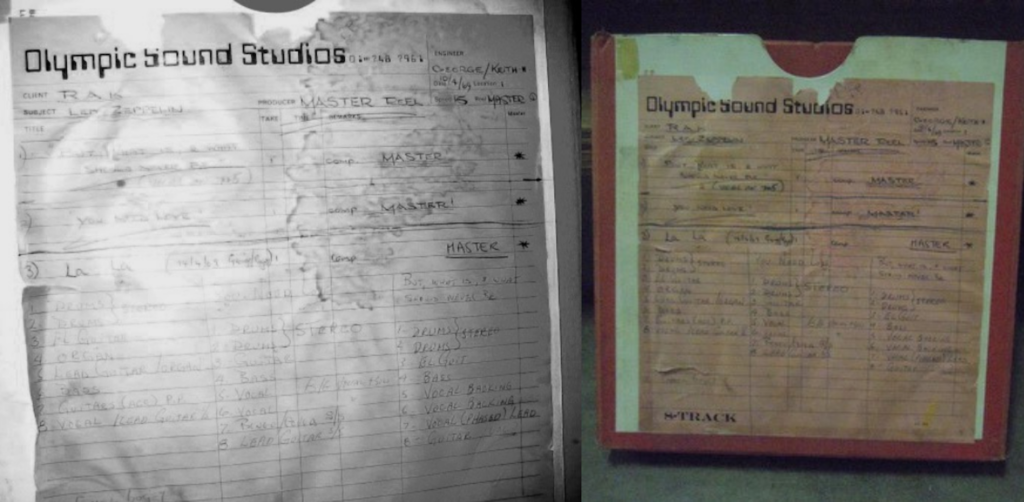
Furthermore, recently emerged photographs of a tape reel box marked April 10, 1969 that was created as Led Zeppelin recorded the band’s second album at London’s Olympic Sound Studios show that “Whole Lotta Love” was originally titled “You Need Love” like the 1962 Waters release, not “You Need Loving” like the 1966 Small Faces version.
The final version of the renamed “Whole Lotta Love”, complete with its titular chorus added and Plant’s earlier vocals repeating “you need love” removed, omitted a writing credit for Dixon, instead crediting it to the four members of Led Zeppelin.
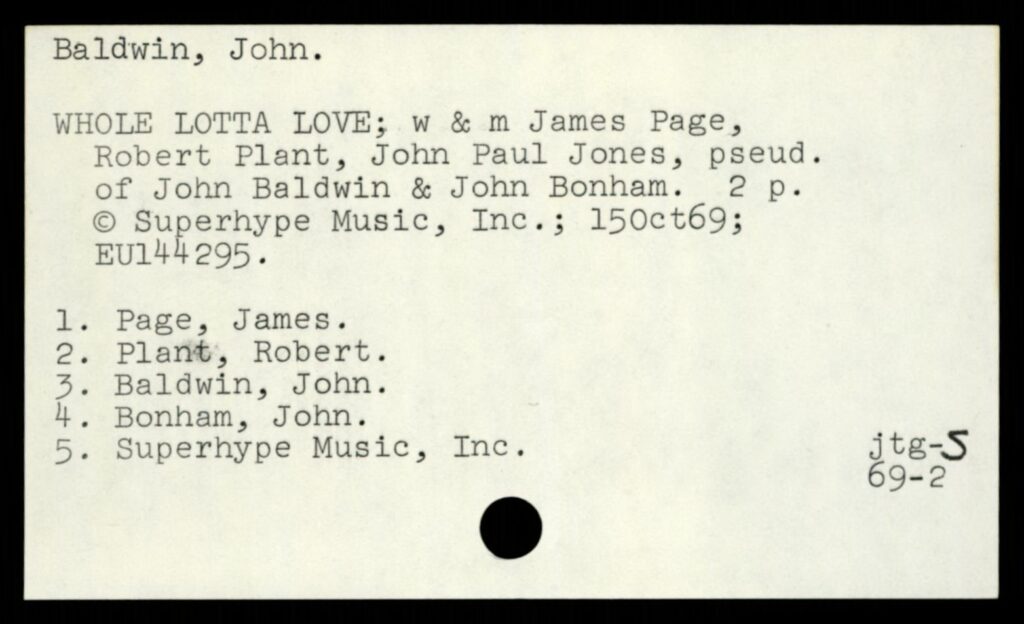
Led Zeppelin’s version of the song was similar enough to the earlier Small Faces song for Marriott to take notice.
“That was our opening number for all the years we were together,” Marriott was quoted as saying in the 2004 official biography “Steve Marriott: All Too Beautiful…” by John Hellier and Paolo Hewitt.
“That’s where Jimmy Page and Robert Plant heard it,” Marriott continued, “Robert Plant used to follow us around. He was like a fan.”
“We did a gig with The Yardbirds which he was at and Jimmy Page asked me what that number was we did. ‘You Need Loving,’ I said, ‘it’s a Muddy Waters thing’ which it really is, so they both knew it,” Marriott explained in the 1995 book “Small Faces: The Young Mods’ Forgotten Story” by Hewitt.
“After we broke up [Led Zeppelin] took it and revamped it. Good luck to them,” Marriott said in Hewitt’s 1995 book. “It was only old Percy who’d had his eyes on it. He sang it the same, phrased it the same, even the stops at the end were the same, they just put a different rhythm to it.”
“For years and years I would hear it come on the radio while driving in America, and I would think, ‘Go on, my son,’ until one day I thought, ‘Fucking hell, that’s us, that is. The bastards,” Marriott added.
During the 1970s, the similarity between Dixon’s 1962 composition “You Need Love,” the Small Faces’ 1966 song “You Need Loving” and Led Zeppelin”s 1969 track “Whole Lotta Love” was noticed by listeners and journalists.
The Small Faces “knew how to plagiarise,” Phil McNeill wrote in the December 25, 1976 issue of NME. “Their brilliant ‘You Need Loving’ is actually the missing link between ‘Whole Lotta Love’ and ‘You Need Love’, retaining Muddy’s basic instrumental feel (Muddy did it with Earl Hooker’s organ-based ‘orchestra’) and bequeathing Zep the vocal phrasing.”
Willie Dixon discovers ‘Whole Lotta Love’
Despite the popularity of “Whole Lotta Love”, Dixon remained oblivious to the similarities between Led Zeppelin’s song and the song he wrote for Waters.
“Willie would never have heard ‘Whole Lotta Love’ because he wouldn’t have been listening to a rock station,” Dixon’s biographer Don Snowden said, according to Barney Hoskyns’ 2012 book “Led Zeppelin: The Oral History of the World’s Greatest Rock Band”.
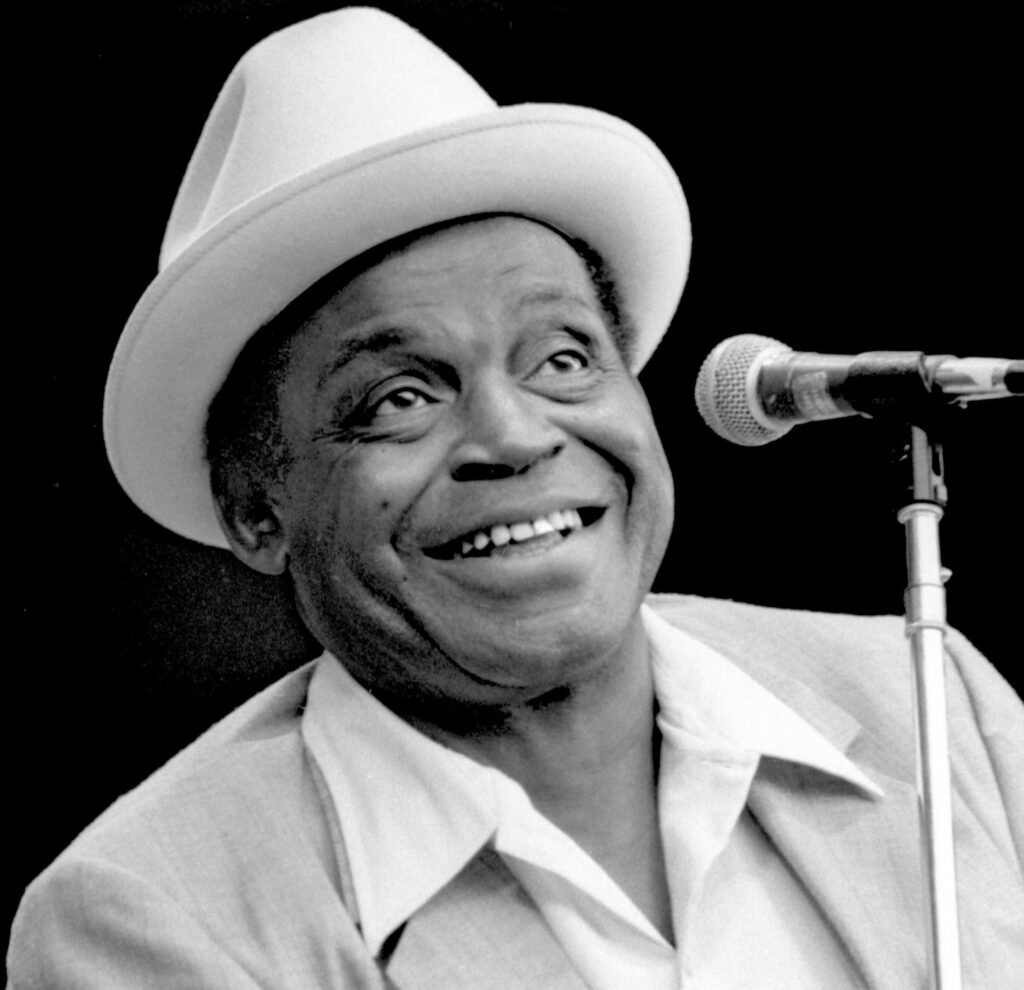
It was only when Dixon’s daughter Shirli heard “Whole Lotta Love” in the late 1970s that her father realised his composition had seemingly been copied.
“I was at [a] girlfriend’s house, and the song came on the radio. And I said, ‘You know what? That’s my dad’s song,’” Shirli Dixon was quoted as saying in the 2010 book “Willie Dixon: Preacher of the Blues” by Mitsutoshi Inaba.
Dixon’s daughter borrowed a copy of Led Zeppelin II, bringing the record home to play for her father. “It was around Christmas time, and I said, ‘Dad, I think I have a present for you,’” Shirli Dixon said in a 1994 interview with The Los Angeles Times.
Dixon and his daughter examined the record sleeve, looking up the songwriting credits for “Whole Lotta Love”.
“As we looked at the album there were other songs on there that he was credited for, but not this one,” Shirli Dixon told journalist Burt Wolf for an episode of his show “Origins with Burt Wolf”.
According to his daughter, Willie Dixon was initially unconcerned at seeing his name missing from the songwriting credits for “Whole Lotta Love”.
“Oh sure, I wrote that song for Muddy many, many years ago and I’m sure they’re paying me for it, we just need to go look up the royalties and make sure I’m being paid,” Shirli Dixon recalled her father saying.
By 1977, Dixon had fallen out with Chess Records’ music publishing wing Arc Music, eventually joining forces with Waters to file a lawsuit against it. According to his Dixon’s wife Marie, Chess’ music publishing arm had failed to notice the similarity between “You Need Love” and “Whole Lotta Love”
“Willie had a publishing company, Arc Music out of New York City, that was supposed to monitor it. You would think they would have been on top of that, but they didn’t care,” she told Hoskyns. “He was pretty happy that they’d recorded ‘Bring It on Home,’ never knowing they would take another song that wasn’t popularly known and give a new title to it.”
It took years for Dixon to decide to take legal action against Led Zeppelin, Shirli Dixon told Wolf. “It was really tough for him to decide to do anything about it, so it took two years before we decided that there was no way to resolve it.”
1985: Willie Dixon files a lawsuit against Led Zeppelin
At 9.11am on Friday, January 11, 1985, Dixon filed a lawsuit against Led Zeppelin in New York, alleging the band infringed his copyright by stealing “You Need Love” and releasing it as “Whole Lotta Love”.
“Jimmy Page, Robert Plant, John Paul Jones and John Bonham purportedly created a musical composition entitled ‘Whole Lotta Love’ by substantially copying wholly original material in Plaintiff’s Composition,” the complaint alleged.
Through his lawyer Robert W. Cinque, Dixon sued the four members of Led Zeppelin as well as their record label Atlantic Records, the band’s US music publishing business Superhype Music, the American Society of Composers, Authors and Publishers and licensing organisation The Harry Fox Agency.
Dixon sought to block Led Zeppelin from “manufacturing, using, selling or advertising the sale of copies” of any records containing “Whole Lotta Love” while his lawsuit worked its way through the courts and “permanently thereafter”.
The complaint demanded that Led Zeppelin and Atlantic Records turn over all copies of “Whole Lotta Love” in their possession, “as well as all plates, molds, matrices, mothers, stampers, pressers, winders” so that they could be destroyed, preventing the band from releasing any more copies of the song.
In return for the alleged theft of his song, Dixon sought damages in excess of $100,000, specifically asking for $1 for each copy of the song manufactured, $5,000 for each copyright infringement before January 1, 1978 and $50,000 for each infringement after that date.
News of the lawsuit reached the press, with Dixon’s representatives alleging the songs were “extremely similar”, according to a report published in the February 9, 1985 issue of Sounds.
“[Dixon] has stated that he’ll give the major portion of any money to the Blues Heaven Foundation, a trust he formed recently to ‘further the protection and documentation of blues as an art form as well as assist the artists who create the music,’” the magazine continued.
Along with his complaint, Dixon also hired music expert Harvey Bacal who reportedly concluded that “the tone and spirit of ‘You Need Love’ has been directly imitated in ‘Whole Lotta Love’”, Sounds reported.
Led Zeppelin deny copying ‘You Need Love’
Plant seemed unconcerned by Dixon’s lawsuit. “I think when Willie Dixon turned on the radio in Chicago 20 years after he wrote his blues, he thought, ‘That’s my song,’” Plant reportedly said in a 1985 NPR interview according to the 2014 legal complaint over “Stairway To Heaven”.
“When we ripped it off, I said to Jimmy, ‘Hey, that’s not our song.’ And he said, ‘Shut up and keep walking,’” Plant reportedly added.
Led Zeppelin’s legal response to the lawsuit was filed on May 29, 1985. Through their law firm Phillips, Nizer, Benjamin, Krim & Ballon, Page and Plant denied all of Dixon’s allegations and insisted they did not steal “Whole Lotta Love” from Dixon.
In a separate filing made on the same day by Atlantic Records and another US business used by Led Zeppelin, Superhype Publishing, the companies claimed that “any alleged similarity between ‘You Need Love’ and ‘Whole Lotta Love’ is insubstantial and immaterial”.
Through their law firm Pryor, Cashman, Sherman & Flynn, the companies argued that Dixon and his lawyers had been aware of “Whole Lotta Love” since its release in 1969. They had never “made any efforts to bar its publication and exploitation”, the filing claimed.
1986: Led Zeppelin fights back
The case proceeded through the New York courts throughout 1985. On May 21, 1986, more than a year after Dixon filed his lawsuit, Led Zeppelin issued a subpoena to Arc Music, the music publishing arm of Chess Records that had originally published “You Need Love”.
As well as planning to depose the company in New York at 10am on June 10, 1986, Led Zeppelin’s lawyers demanded a list of documents including correspondence between Dixon and his former music publishers about “You Need Love” and “Whole Lotta Love” as well as any documents relating to Dixon’s song “Bring It On Home”.
Led Zeppelin’s lawyers also demanded documents about the 1970 lawsuit Arc Music had brought against Atlantic Records. That lawsuit had alleged that “Bring It On Home”, also from Led Zeppelin II, copied the Sonny Boy Williamson song of the same name that was originally written by Dixon. It also alleged that “The Lemon Song” copied Howlin’ Wolf’s song “Killing Floor”.
That case was eventually settled out of court, with Dixon and Howlin’ Wolf (under his real name Chester Burnett) given songwriting credits for the songs. Burnett received a cheque for $45,123 in December 1972 following the settlement, legal filings reported on in the 2004 book “Moanin’ at Midnight: The Life and Times of Howlin’ Wolf” by James Segrest and Mark Hoffman show.
By this point, Led Zeppelin’s legal representative in the “Whole Lotta Love” case was George Fearon, the band’s veteran outside legal counsel from Phillips, Nizer, Benjamin, Krim & Ballon. He now represented all three of the surviving band members as well as Bonham’s estate, not just Page and Plant.
1987: Led Zeppelin deny hearing ‘You Need Love’ before writing ‘Whole Lotta Love’
On January 30, 1987, more than two years after Dixon filed his lawsuit, Led Zeppelin’s lawyers filed a proposed findings of facts that forcefully rebutted Dixon’s allegations.
In the document, Led Zeppelin’s lawyers claimed that the members of Led Zeppelin had not heard “You Need Love” before writing and recording “Whole Lotta Love” in 1969.
It was difficult for the band to have heard the song, Led Zeppelin’s lawyers argued, as “Dixon never performed ‘You Need Love’ at any of his own public performances.”
Furthermore, the band’s lawyers again claimed that the music and lyrics of “Whole Lotta Love” are “not substantially similar” to “You Need Love”.
This was a key legal argument by the band’s lawyer. US copyright law required Dixon’s lawyer to prove that Led Zeppelin both had access to the 1962 Waters song “You Need Love” and that “Whole Lotta Love” was substantially similar to it.
By arguing that Led Zeppelin never had access to the song and that the songs weren’t similar, the band’s lawyer was attempting to shut down the basis of Dixon’s lawsuit.
Elsewhere in the filing, Led Zeppelin’s lawyers argued that Dixon should have complained about the alleged similarity between the two songs when his then music publisher Arc Music sued Led Zeppelin over two different songs from Led Zeppelin II in 1970.
Dixon “should have discovered the alleged claim … at or about the time Arc Music Corp. sued for copyright infringement,” Led Zeppelin’s lawyers wrote.
Because the 1970 lawsuit didn’t include an allegation of copyright infringement over “Whole Lotta Love”, the document read, Dixon was “bound by the conduct and/or failure to act of Arc Music.”
Led Zeppelin’s lawyers also wrote that in response to their subpoena to Arc Music, they had found that the music publishing company had “destroyed all of its business records”. The documents destroyed included any records of royalty payments for “You Need Love”, meaning Led Zeppelin couldn’t track how much Dixon had received for writing the song.
In the same document, Led Zeppelin’s lawyers pointed out that the band had given Dixon a songwriting credit on the songs “You Shook Me” and “I Can’t Quit You Baby” on the band’s 1969 debut album.
Did Led Zeppelin really never hear ‘You Need Love’ before writing ‘Whole Lotta Love’?
Led Zeppelin’s lawyers’ statement that the band never heard the 1962 Waters single “You Need Love” before writing “Whole Lotta Love” in 1969 is a bold claim given the fact that the band released “You Shook Me” on its debut album.
Like “You Need Love”, the original Waters release of “You Shook Me” was written by Dixon and released as a single in 1962. It was then re-released on the same UK four-track EP as “You Need Love” in 1963.
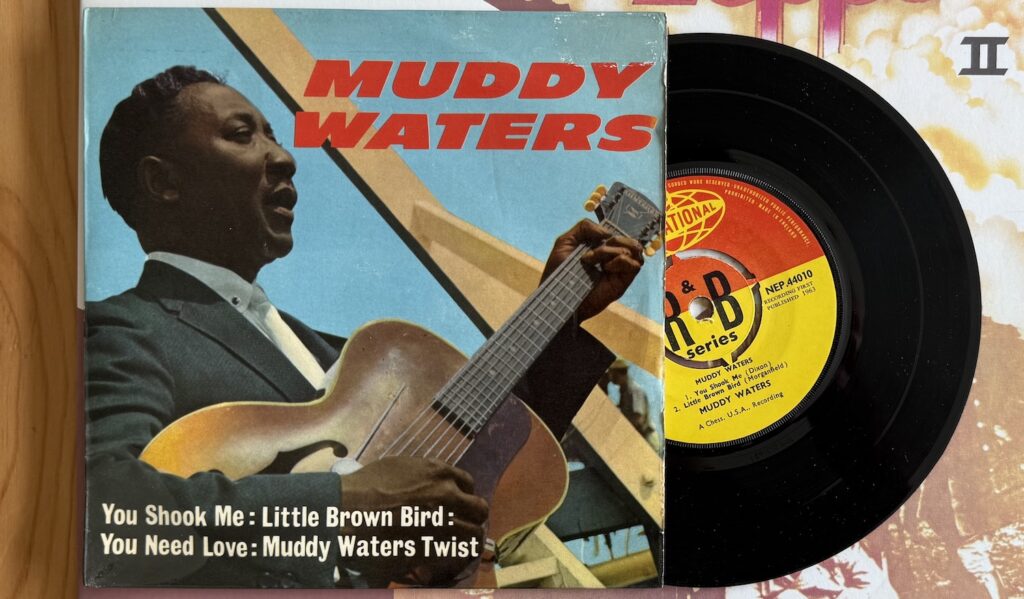
Neither “You Need Love” or “You Shook Me” had single releases in the UK, meaning it’s likely the members of Led Zeppelin first heard “You Shook Me” on the 1963 four-track EP. If that is the case, it was the band’s legal position in 1987 that the members of Led Zeppelin never listened to the rear side of the EP that begins with “You Need Love” before 1969.
It’s also possible that “You Need Love”, “You Shook Me” or some of their lyrics may have been passed to Page during a meeting with Dixon in the UK, likely between 1962 and 1964.
Giorgio Gomelsky, the early Rolling Stones manager who later managed The Yardbirds and produced early works by Page, claimed that Dixon met Page while visiting Europe as part of the American Folk Blues Festival.
“There was Howlin’ Wolf, Sonny Boy [Williamson] and Willie Dixon, the three of them sitting on this sofa,” Gomelsky said, according to the 1989 book “I Am the Blues: The Willie Dixon Story” by Dixon and Snowden.
“Willie was just singing and tapping on the back of the chair and Sonny Boy would play the harmonica and they would do new songs. To a degree, that’s why people know those songs and recorded them later,” he continued. “I remember ‘300 Pounds of Joy’, ‘Little Red Rooster’, ‘You Shook Me’ were all songs Willie passed on at that time … Jimmy Page came often, the Yardbirds, Brian Jones.”
Dixon, quoted in the same book, recalled: “I left lots of tapes when I was over there [in London … I told] them anybody who wanted to could go and make a blues song. That’s how the Rolling Stones and the Yardbirds got their songs”.
Page has spoken about attending the American Folk Blues Festival in Manchester in October 1962, telling Uncut magazine in 2023 that “it was a clarion call for all blues collectors and enthusiasts.” He has never confirmed meeting Dixon, however.
1987: Led Zeppelin reaches a settlement with Willie Dixon
By early 1987, Dixon’s case seemed to be progressing towards a trial. At 10.30am on January 13 and 14, 1987, it appears that Page, Plant and Jones were scheduled to be deposed by Dixon’s lawyers in the 91 Tabernacle Street office of their accountancy firm Joan Hudson & Co.
In preparation for the trial, Led Zeppelin hired two leading expert witnesses to give evidence that “Whole Lotta Love” couldn’t have been copied from “You Need Love”. Daniel A. Ricigliano, the author of several textbooks on musical composition, signed up as an expert witness along with songwriter turned plagiarism expert Harold Barlow.
At a preliminary court hearing, likely in early 1987 ahead of an eventual trial, Judge Conner reportedly “said that he noticed a similarity in the lyrics” between the two songs but not the music, according to a report published in the March 6, 1987 issue of The Hard Report.
With the judge’s comments suggesting that Led Zeppelin could be in for a bruising loss at trial, the band’s lawyers met with Dixon’s representatives to negotiate a settlement. Eventually, a deal was reached on February 5, 1987.
There is no indication in the legal documents obtained by LedZepNews that Led Zeppelin was forced to settle the lawsuit because of the emergence of the tape box with the handwritten original title for “Whole Lotta Love” of “You Need Love”, as has been claimed on the Royal Orleans forum.
On March 2, 1987, Led Zeppelin’s lawyer Fearon called the chambers of Judge Conner and spoke to his staff, explaining that Led Zeppelin and Dixon were working on a settlement that would be concluded by the end of the month.
“On behalf of myself, my colleagues and our clients, I wish to take this opportunity to thank the Court for its efforts in bringing this case to an amicable resolution,” Fearon wrote in a March 3, 1987 letter to Judge Conner.
Dixon’s manager said in a statement to the press following the settlement that: “The suit has been settled on both sides to our mutual satisfaction. We’ve agreed not to discuss further details,” according to The Hard Report.
By September 28, 1987 the case was officially dismissed with Dixon dropping his case against The Harry Fox Agency, the sole remaining defendant. It’s likely that Led Zeppelin provided Dixon with a financial settlement without any admission of wrongdoing.
“There was a settlement out of court, but there was no significant money to Willie from record sales,” Dixon’s wife Marie told Hoskyns for his 2012 book. “He went to his grave feeling that he was not represented properly.”
“You probably read somewhere where it was seven million dollars, but none of that happened. Not one million, not close to one million,” she continued. “It was very disappointing to Willie, but he said he didn’t have time to be angry with people. He never carried any bitterness. I believe he passed away as a very happy person.”
1996: Marie Dixon sues Led Zeppelin
Dixon may have received an out of court settlement from Led Zeppelin, but the band still omitted any songwriting credit for him on “Whole Lotta Love” following the agreement.
No credit for “Whole Lotta Love” was given to Dixon on Led Zeppelin’s 1990 Remasters box sets, nor the band’s 1993 Complete Studio Recordings box set.
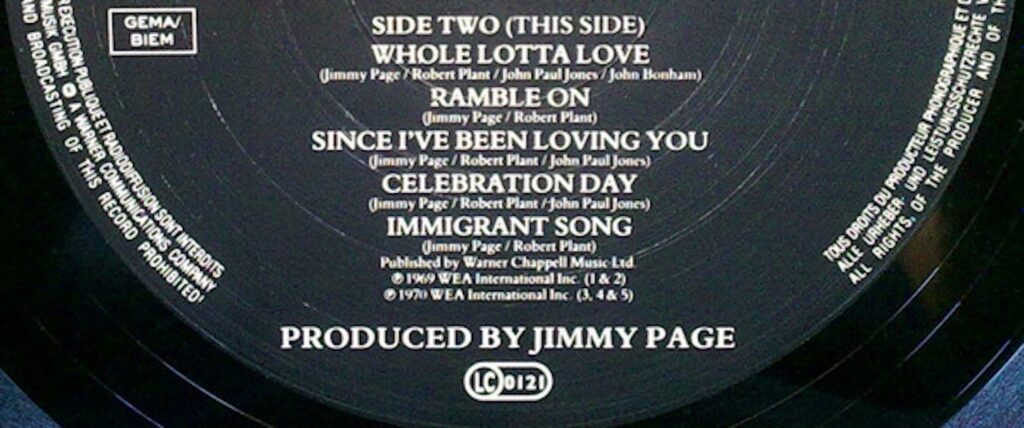
It was against this backdrop that Marie Dixon, Dixon’s widow following his death on January 29, 1992, sued the three surviving members of Led Zeppelin and Atlantic Records on September 4, 1996.
The details of that lawsuit are unclear beyond being listed as a “contract dispute” on PACER, the US government’s courts database, with the amount demanded listed as $0. Like the 1985 lawsuit, the judge overseeing Dixon’s widow’s legal complaint was Judge Conner.
Dixon’s widow’s lawsuit was settled on May 13, 1998. Led Zeppelin’s next compilation release, the 1999 “best of” album now known as Early Days, gave her late husband a songwriting credit for “Whole Lotta Love” for the first time.
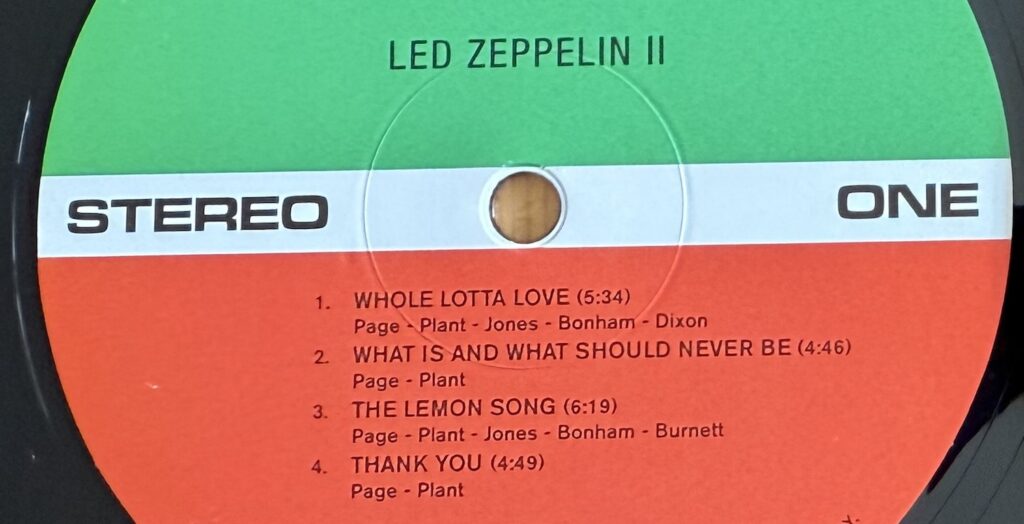
‘You only get caught when you’re successful’: What Led Zeppelin members have said about the lawsuit
In the years following the 1987 settlement with Dixon, Page and Plant have made a series of comments about the lawsuit. Asked by NPR in an interview broadcast on January 22, 2004 whether it was upsetting being sued by Dixon, Plant replied: “Not at all, no.”
According to Plant’s comments in that interview, the members of Led Zeppelin believed they were continuing the tradition of transforming music.
“We had an idea throughout the time in the band that we were in part of some kind of flow that began either with the chain gang music of Mississippi, ‘Parchman Farm’, Dockery Plantation down on with the medicine shows of the nineteenth century, Joe Turner, ‘See See Rider’, the whole idea of the origin of these songs was quite translucent and almost eternal,” Plant said.
“Our impression was that all this music was kind of translucent and moved on down through time and with the power of Jimmy Page’s guitar riff and the actual ‘Want a whole lotta love’ vocal line which became the chorus and the psychedelic centrepiece, the melody was the lift, my responsibility, but it was only a part of the entire effect so I just thought it was part of the game,” he added. “That might sound naive and irresponsible but there’s so much of it about … our version was a conglomeration of originality and the lift of the lyric.”
Speaking to Musician magazine in 1990, Plant seemed to take responsibility for basing his lyrics on Dixon’s. “Page’s riff was Page’s riff. It was there before anything else,” he said. “I just thought, ‘well, what am I going to sing?’ That was it, a nick. Now happily paid for. At the time, there was a lot of conversation about what to do. It was decided that it was so far away in time and influence that … well, you only get caught when you’re successful. That’s the game.”
When asked about the lawsuit, Page has sought to shift the blame to Plant or denied knowing the result of Dixon’s lawsuit. “I don’t know what the outcome was,” Page told Musician magazine for its July 1988 issue. “It’s probably on file somewhere. I’m just not interested.”
When asked if “you had taken lyrical content” from Dixon’s song in the 1988 interview, Page corrected the interviewer: “We. We as a band.”
Page’s finger pointing at Plant has sometimes been specific. “You should ask Robert these things, because I didn’t write the words, did I,” he told Hoskyns in 2003.
“Robert was supposed to change the lyrics, and he didn’t always do that– which is what brought on most of the grief. They couldn’t get us on the guitar parts of the music, but they nailed us on the lyrics,” Page told Guitar World in a 1993 interview.
Page has consistently denied that his riff infringed on Dixon’s song. “Some people said later that ‘Whole Lotta Love’ was based on Willie Dixon’s ‘You Need Love’ and the Small Faces’ ‘You Need Loving’. My riff – the basis for the entire song – sounds nothing like either of them,” Page said in the 2016 book “Anatomy of a Song: The Oral History of 45 Iconic Hits That Changed Rock, R&B and Pop” by Marc Myers.
“Robert had referenced the Dixon lyrics because with my riff, they felt right,” Page continued. “This eventually forced us to give Dixon a cocredit on our song. But if you take Robert’s vocal out, there’s no musical reference to either song.”
Page has seemed less willing in recent years to blame Plant specifically. “I had a riff, which is a unique riff, O.K., and I had a structure for the song that was a unique structure. That is it,” he told The New York Times in 2014. “However, within the lyrics of it, there’s ‘You Need Love,’ and there are similarities within the lyrics. Now I’m not pointing a finger at anybody, but I’m just saying that’s what happened, and Willie Dixon got credit. Fair enough.”
The only comment from Jones on the lawsuit appears to be one published in Hoskyns’ 2012 book that originates from an April 2003 interview. “The whole question of the appropriation of black music by white musicians is just so … the whole thing is that nobody really owns any music,” Jones said.
“There’s a lot of white church music in black music. Anybody who can make music is affected by what’s going round. They’re all materials to be used to make more music,” he added.
How we obtained the legal files
Our hunt for the Dixon lawsuit documents began on PACER, the federal court search engine. The 1985 lawsuit was not listed on PACER, meaning it wasn’t possible to quickly look up the case or download any documents relating to it.
We then contacted the Blues Heaven Foundation, an organisation Dixon set up in 1982 to preserve the history of blues music. They didn’t have any of the files.
This meant we had to dig deeper to find the legal files. We eventually found a mention of the lawsuit in a 1992 bulletin issued by the Library of Congress as well as a single filing from the case published by The George Washington University. These files gave us enough details to ask legal researchers for help since we had the case name and case number.
LedZepNews contacted Rebecca Harris of Diligent Data Services, a legal research firm based in New York. She contacted the United States District Court for the Southern District of New York who looked up the lawsuit, sending Harris a letter containing the details of the lawsuit files’ transfer to the National Archives.
According to the Manhattan court staff, the files were held by the National Archives in Philadelphia. But when we contacted them, they came back to explain that the files had been transferred to the National Archives in Kansas City.
Staff at the Kansas City branch of the National Archives confirmed they held one of the two collections of documents relating to the lawsuit, but the second box is missing after it was transferred back to the New York court system.
Due to limitations set by the National Archives, we were only able to pay for a maximum of 250 pages from the 317 surviving pages of legal files relating to the lawsuit. 11 documents held by the National Archives are not present in the scanned documents we obtained and published.
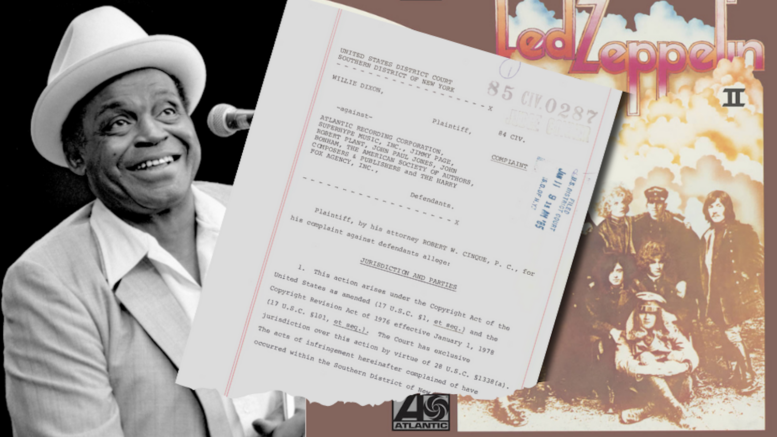
they should have gave credit from day one to the likes of dixon and a thew others example on songs how many more times dazed and confused if not they get slagged of for being rip of covers band as someone said on this website the other day
Must say, the truculent refusal of rocknrollers to give credit to the musicians they so clearly raided is shameful. The originators of not only the genre itself, the sounds , the lyrics and the melodies deserve much better, even veneration and honor , for their timeless contribution. Guilty as charged. Led Zep owes blues artists plenty for their success.